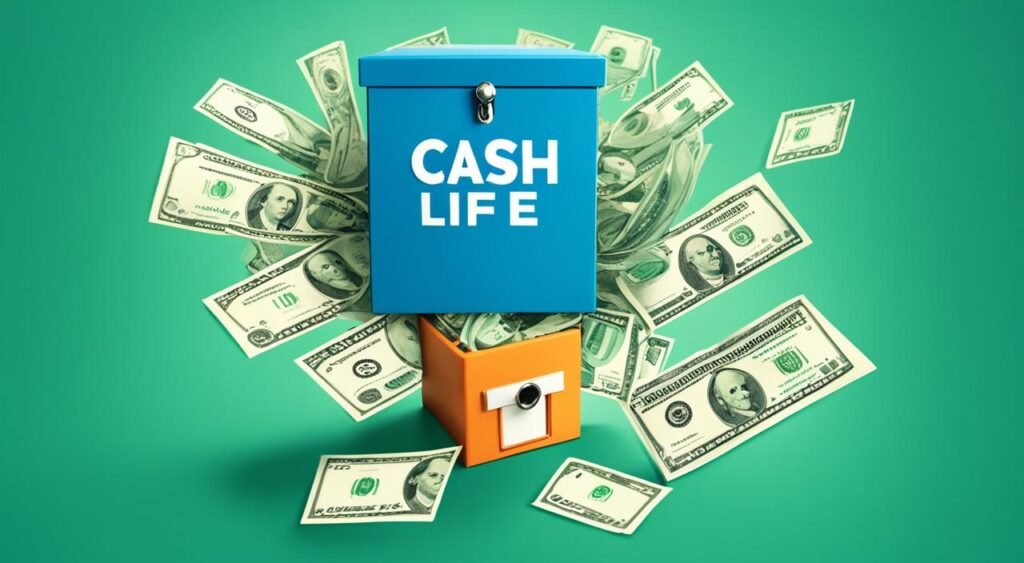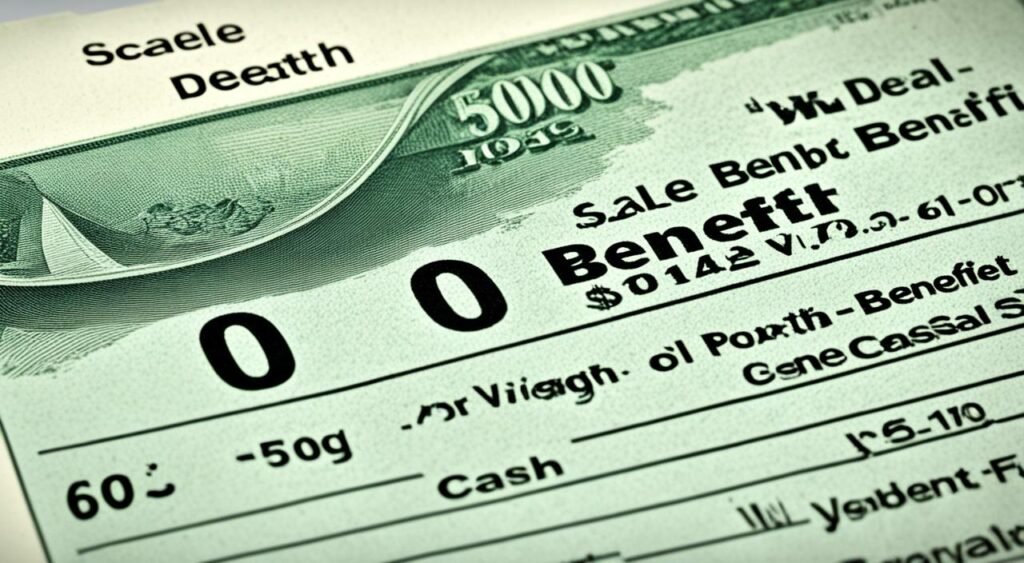Cash value life insurance is a kind of permanent life insurance that comes with a savings part. It’s different from term life insurance, which covers you for a certain number of years. Cash value policies stay with you for life if you keep paying premiums. The cash value part of these policies grows over time.
This lets policyholders use the funds for different things. They can borrow against the policy or use the cash to pay premiums.
Key Takeaways
- Cash value life insurance is a type of permanent life insurance with a savings component.
- The cash value of the policy grows over time, earning interest and deferring taxes on the accumulated earnings.
- Policyholders can access the cash value for various purposes, such as borrowing or withdrawing funds.
- Cash value life insurance is more expensive than term life insurance but provides lifelong coverage.
- The cash value component reduces the insurance company’s risk as it offsets part of the insurer’s liability.
Understanding Cash Value Life Insurance
Permanent life insurance, like whole and universal life, lets people build cash value savings over time. This cash value is a living benefit. It lets policyholders use their cash value account when they need it.
Cash value life insurance doesn’t end after a certain time. It covers you for life. The interest accrues on the cash value, helping you build cash value over years. You can use this cash through loans or withdrawals, but it will lower the death benefit.
Key Takeaways
- Permanent life insurance, such as whole and universal life, can build cash value over time.
- The cash value is a living benefit that policyholders can use through loans or withdrawals.
- Cash value life insurance policies don’t end after a certain time, unlike term life insurance.
- Using the cash value will decrease the death benefit for your beneficiaries.
- The insurance company’s risk is higher with cash value life insurance policies compared to term life insurance.
Also Read: Discover The Top Public University In The Us
How Cash Value Life Insurance Works

Cash value life insurance is a type of permanent life insurance. It covers the policyholder for their entire life. Unlike term life insurance, it has higher premiums. But, a part of each payment goes into a cash value account that grows with tax-deferred interest.
As the cash value grows, the insurance company’s liability goes down. This is because the cash value helps pay off part of the death benefit. Over time, the premiums stay the same or might even go down. This makes cash value life insurance a good choice for those looking for long-term coverage.
The cash value account acts like a savings account. Policyholders can use the money through loans or withdrawals if they need to. This is great for people who want life insurance and can also use the money they’ve saved over time.
In summary, cash value life insurance gives you life-long protection and the chance for your cash value to grow. It’s a top pick for those wanting a flexible and comprehensive life insurance solution.
Also Read: What Is Workers Compensation Insurance?
Accessing the cash value

As a policyholder, you have several options to access the cash value in your life insurance policy. You can withdraw cash, take out policy loans, or use the cash to pay premiums. These are just a few ways to use this valuable asset.
Ways to Access Cash Value
Many life insurance policies let you make partial withdrawals from the cash value. This will lower the death benefit for your beneficiaries. Some policies don’t limit how often or how much you can withdraw, while others do.
You can also borrow against your policy’s cash value through a policy loan. This loan reduces the death benefit, but the interest rate is often lower than bank loans. Paying back the loan can increase the death benefit again.
Also Read: What Career Services Do Universities Offer To Students?
If your policy has enough cash value, you might use it to pay your premiums. This way, you can keep your coverage without paying out-of-pocket.
As a last option, you can surrender your policy for the full cash surrender value. But, this ends your policy and your beneficiaries won’t have a death benefit anymore.
Remember, if you take out more cash value than you’ve paid in, the extra might be taxed as ordinary income.
| Method | Impact on Death Benefit | Taxation |
|---|---|---|
| Partial Withdrawal | Reduces death benefit | Taxable if amount exceeds premiums paid |
| Policy Loan | Reduces death benefit by loan amount | Loan is not taxable, but interest may be |
| Pay Premiums | No impact on death benefit | No taxation |
| Surrender Policy | Terminates death benefit | Taxable if amount exceeds premiums paid |
Using the cash value of your life insurance policy can give you financial flexibility. But, it’s key to know the possible effects and tax rules. Talk to your insurance agent or a financial advisor to find the best way for your needs and goals.
Also Read: Top Tips For A Successful Insurance Claim
Why Consider Cash Value Life Insurance?

For those wanting to grow a big nest egg, permanent life insurance with cash value is worth looking into. It’s a good choice alongside traditional retirement plans like an IRA or 401(k).
Permanent life insurance lets you borrow against the cash value of your policy. As you pay premiums, part of the money builds up as cash value. You can use this cash if you need it.
But, remember, cash values start growing after two to five years. You might have to wait a few years to get to the cash value or face a penalty. Also, borrowing from the cash value could affect your retirement plan.
Even with its downsides, cash value life insurance is useful for diversifying your finances. It helps build a nest egg for the future. Always think about your financial goals and talk to a financial advisor before deciding.
| Pros of Cash Value Life Insurance | Cons of Cash Value Life Insurance |
|---|---|
|
|
Choosing cash value life insurance depends on your financial goals, how much risk you can handle, and your investment plan. Think about the good and bad points to see if this policy fits your financial goals.
Also Read: Top Universities For Medical Studies In Us
Types of Life Insurance Policies with Cash Value

There are many life insurance policies that offer cash value. Whole life, universal life, variable life, and indexed life insurance are some examples. Term life insurance does not have a cash value part.
Whole life insurance is a permanent type that builds cash value over time. The premiums stay the same. A part of each payment goes to the death benefit, and the rest to the cash value account.
Universal life insurance is also a permanent type with flexible premiums and death benefits. The cash value can grow with the investment performance of the policy.
Variable life insurance lets policyholders invest the cash value in different sub-accounts, like mutual funds. The cash value and death benefit can change with the investment results.
Indexed life insurance is a type of universal life that earns interest tied to a market index, like the S&P 500. This can lead to growth and some protection against losses.
Term life insurance doesn’t have a cash value. It’s a policy that only pays out a death benefit during a set time.
Choosing a life insurance policy with cash value depends on your financial goals, how much risk you can handle, and your long-term needs.
Cash Value Accumulation and Growth

The cash value of life insurance policies grows over time. It earns interest and dividends on the funds it holds. As premiums are paid, the cash value increases, becoming a valuable asset for policyholders. The cash value’s growth depends on several factors, including investment performance, premium payments, and policy structure.
Factors Affecting Cash Value Growth
The growth of a life insurance policy’s cash value depends on several key factors:
- Investment Performance: For policies that allow investing the cash value, like variable life insurance, the investment performance matters a lot. Good investments can make the cash value grow faster.
- Premium Payments: How much and how often policyholders pay premiums affects cash value growth. Paying more and more often can speed up the cash value increase.
- Policy Structure: The design and features of the policy, like the interest rate or expenses, can change how fast the cash value grows.
Knowing these factors helps policyholders make smart choices to grow their life insurance cash value. This can help them use it to their financial benefit.
“The cash value of a life insurance policy is a valuable asset that can grow over time, providing policyholders with financial flexibility and security.”
Borrowing Against or Withdrawing Cash Value
You can borrow against or withdraw from your life insurance policy’s cash value. Policy loans let you borrow against the cash value, which lowers the death benefit. Or, you can make withdrawals, which also cuts the death benefit.
Remember, if you take out more than you’ve paid into the cash value, it’s taxed as regular income. This could affect your taxes, so think about it before using your policy’s cash value.
| Option | Impact on Death Benefit | Tax Implications |
|---|---|---|
| Policy Loans | Reduces the death benefit by the outstanding loan amount | No immediate tax consequences |
| Withdrawals | Reduces the death benefit by the withdrawal amount | Withdrawals beyond the amount paid into the policy are taxed as ordinary income |
When thinking about policy loans or withdrawals, think about how it might change your death benefit. Make sure to look at your financial needs carefully. This way, you can make the best choice for you.
Cash Value and the Death Benefit

Life insurance has two main parts: the cash value and the death benefit. The death benefit is a lump-sum payment given to the policyholder’s loved ones when they pass away. The cash value can change how much the death benefit is.
If the policyholder takes loans or makes withdrawals from the cash value, it can lower the death benefit for their beneficiaries. If they take out all the cash value, the policy ends, and there’s no death benefit left.
| Scenario | Impact on Death Benefit |
|---|---|
| No loans or withdrawals from cash value | Full death benefit paid to beneficiaries |
| Outstanding loans or prior cash value withdrawals | Death benefit reduced by the amount of loans or withdrawals |
| Complete withdrawal of cash value | Policy terminates, and there is no death benefit paid |
It’s crucial for policyholders to know how the cash value and death benefit are linked. This knowledge helps ensure their loved ones get the most from the death benefit when the policyholder passes away. By managing the cash value wisely, policyholders can make sure their beneficiaries get the full death benefit. life insurance company type of policy insurance coverage , insurance premiums receive the death benefit.
Also Read: What Is Life Insurance For Kids And What Are The Benefits?
Conclusion
Cash value life insurance is a special financial tool. It gives you coverage for life and lets you use the money you’ve saved for different needs. By putting part of your premium into an account that earns interest, your money grows over time.
This money can be used to help with retirement, unexpected bills, or education costs. It’s a way to get extra money without paying taxes on it until you take it out.
Even though cash value life insurance costs more than term life insurance, it offers more benefits. It gives you permanent coverage and lets you use the cash you’ve saved. This makes it a good choice for those wanting a full life insurance plan.
It’s great for planning for retirement, protecting your family, or adding to your financial plans. Cash value life insurance can be a key part of your financial strategy.
Choosing cash value life insurance depends on your personal needs and financial goals. Knowing how it works and its benefits helps you make a smart choice. This choice should match your financial plans and protect your family’s future.
FAQs
Q: What is cash value in life insurance?
A: Cash value in life insurance refers to the savings component that can build over time in certain types of permanent life insurance policies. It is the amount of money that policyholders can access while they are still alive, in addition to the death benefit.
Q: How does a life insurance policy build cash value?
A: Life insurance policies that offer cash value typically accumulate this value through a portion of the premiums paid by the policyholder. This cash value grows tax-deferred over time and can be accessed through withdrawals or loans.
Q: What are some benefits of cash value life insurance?
A: Cash value life insurance offers benefits such as the ability to build savings over time, potential for tax-deferred growth, access to funds through loans or withdrawals, and the option to use the cash value to cover premiums or other expenses.
Q: What is the difference between whole life insurance and term life insurance?
A: Whole life insurance is a type of permanent life insurance that offers a cash value component, while term life insurance provides coverage for a specific period without accumulating cash value.
Q: Can you explain the concept of guaranteed cash value in life insurance?
A: Guaranteed cash value in life insurance refers to the minimum amount of cash value that a policy will accumulate over time, ensuring that there is a guaranteed level of savings regardless of market performance.
Q: How can one access the cash value in a life insurance policy?
A: Policyholders can access the cash value in a life insurance policy by taking out a loan against the cash value, making a withdrawal, or surrendering the policy in exchange for the cash value amount.
Q: What are some types of cash value life insurance policies?
A: Some types of cash value life insurance policies include whole life insurance, universal life insurance, variable universal life insurance, and indexed universal life insurance, each offering different features and benefits.
Source Links
- https://www.newyorklife.com/articles/cash-value-life-insurance
- https://www.investopedia.com/terms/c/cash-value-life-insurance.asp
- https://www.aflac.com/resources/life-insurance/cash-value-life-insurance.aspx





